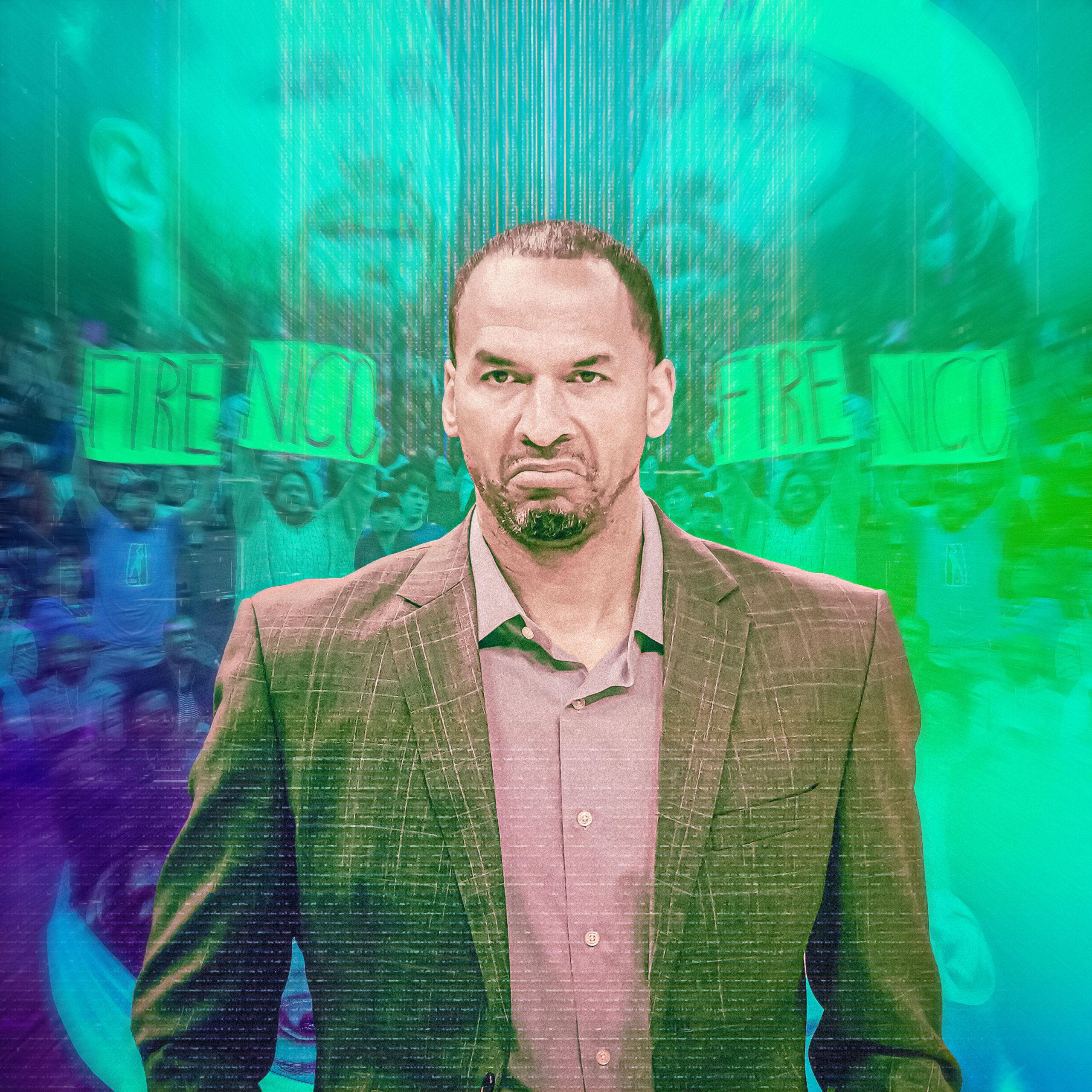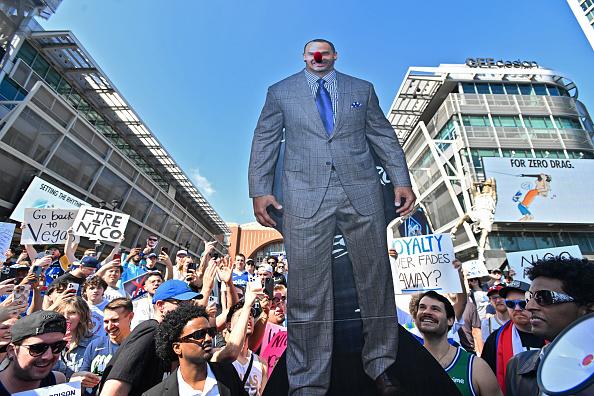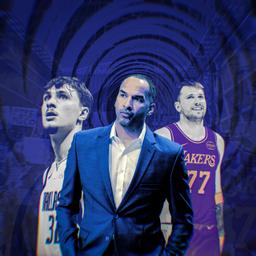
From the moment he was tapped to run the Dallas Mavericks in 2021, Nico Harrison profiled as a profoundly unconventional NBA general manager. He’d been plucked from Nike, not a competing front office. He’d assembled a roster of endorsers, but never a roster of scorers and playmakers. He knew dozens of basketball stars, but he’d never drafted one. Skeptics reasonably wondered whether he was the right person for the job.
Three years later, Harrison sat in a lower-bowl seat at the Boston Garden, observing an off-day practice before Game 2 of the 2024 NBA Finals—his very presence a symbolic rebuttal. A risky trade for Kyrie Irving had paid huge dividends. Smaller deals to acquire P.J. Washington and Daniel Gafford, each criticized in the moment, had also been vindicated. So, too, it seemed, had Harrison. “I was a nontraditional hire,” he told The Ringer in 2024, although not an unqualified one.
After all, Harrison noted, he’d been around basketball his whole life. He’d played four years in college and professionally in Belgium, Lebanon, and Japan. He knew the sport. He knew the business. He understood the NBA landscape.
“I'm gonna say this without being arrogant,” he told me. “I was an executive at a Fortune 200 company. So I had teams of 150 people. I had budgets bigger than the NBA budget that I was in control of. So yeah, I think I was a risk. But I've been in basketball for 20 years. I think leadership transfers from industry to industry. … But I was outside the box. But I think sometimes outside the box is good.”
But what if the box gets torn to pieces on the way out? What if your unconventional, unchecked impulses render the box wholly unrecognizable, nonfunctional? What then?
Well, then you inevitably get fired, as Harrison was on Tuesday, just nine months after executing the most outside-the-box transaction in NBA history: the shocking trade of Luka Doncic to the Los Angeles Lakers, for a lackluster return built around an aging, oft-injured Anthony Davis.
The trade was ill-conceived in the moment and only looks worse by the day. The Mavericks are flailing, starting this season 3-8. Davis has played in just 14 of 44 games since arriving. Irving blew out his ACL in March and won’t be back anytime soon. A team that was three wins from the title in 2024 is now vying for the worst record in the Western Conference. Dallas fans were chanting “Fire Nico” so often that it practically became the city’s anthem.
So Harrison—who swiftly changed his Instagram bio to “unemployed” on Tuesday—now takes his place in the dustbin of NBA ignominy, where he will remain for … well, at least the duration of this universe’s existence. That’s the thing about making the worst trade in NBA history: You don’t get a do-over, and you don’t get a second chance to prove your worth.
Harrison almost certainly won’t be getting another front-office gig anytime soon (read: ever), which means that his four-year run in Dallas will stand as his NBA résumé and his legacy for all time. The Luka trade will forever be the top line. It will be written in ALL CAPS, boldface, and in a very harsh font. No one will ever forget it. Mavericks fans will never forgive it.
NBA annals are filled with terrible deals and the terrible GMs who made the terrible deals. But in the Dante’s Inferno of bad NBA execs, Harrison has earned his own tier, a private circle of reputational hell. Other fallen GMs are defined by an amalgam of bad decisions, spread over years—a bloated contract here, a blown draft there. Only Harrison will be remembered for a singular, profoundly catastrophic trade.
Doncic isn’t just a perennial MVP candidate but a generational talent firmly in his prime. You trade those players only if they demand it (and even then, you try to talk them down); Doncic never asked out or wanted out of Dallas. And if you do have to trade them, you play the market, engage as many bidders as possible, and get the greatest return possible. Harrison did none of these things.
Even some of the diciest trades in NBA history could be rationalized in the moment—a product of desperate circumstances or financial duress or overwhelming pressure to chase a title. But none of these factors were at work in the Luka trade.
There are no historical comps for Harrison’s tenure or his most infamous decision. Even some of the most criticized and controversial team execs of the past quarter century can’t match him.

Mavericks fans lift a cutout of Harrison during a protest of the Doncic trade
Isiah Thomas had a disastrous run with the Knicks in the mid-2000s, spending wildly and sacrificing draft picks while assembling a clunky roster of overpaid misfits that never won anything. His moves set the franchise back years. But Thomas never traded a generational superstar in his prime for a broken-down All-Star.
Former Minnesota Timberwolves GM David Kahn is infamous for taking two other point guards (Ricky Rubio and Jonny Flynn) ahead of Stephen Curry in the 2009 draft. He also made countless other errors and said many regrettable things and is generally regarded as one of the worst GMs in modern times. But Kahn never traded a generational superstar in his prime for a broken-down All-Star.
Ernie Grunfeld was run out of Washington after a relentlessly mediocre 16-year tenure with the Wizards. But Grunfeld at least had previous success in New York and Milwaukee. And for all the mistakes he made in Washington, he did draft John Wall and Bradley Beal and, critically, did not trade a generational … well, you get the point.
Billy King’s tenure in Brooklyn will forever be remembered for the ill-fated acquisition of an aging and fading Paul Pierce and Kevin Garnett—a deal that sent Boston the picks that would become Jaylen Brown and Jayson Tatum and stymied the Nets for years. But the Pierce-Garnett deal was, in fact, mostly praised at the time, in part because the two former Celtics were viewed as the final touches on a contending roster that already featured three younger stars (Deron Williams, Joe Johnson, and Brook Lopez). Also notable: King was working for an owner, Mikhail Prokhorov, who had promised a title within five years of buying the team—and pushed hard for every win-now move. And King’s overall résumé is buttressed by his years in Philadelphia, where he put together the team that made the 2001 Finals.
Scroll through the NBA archives, and you’ll find any number of boneheaded trades, bad bets, and even reasonable deals that backfired. You’ll find plenty of venom for Thomas, Kahn, Grunfeld, King, Elgin Baylor, Bryan Colangelo, Gar Forman, Stu Jackson, and Vlade Divac.
But none ever made a single transaction as egregiously, painfully, and obviously calamitous as the trade Harrison executed on that shocking Saturday night in February. And none were ever fired as swiftly for their mistakes.
Lest we forget, Harrison does deserve credit for the moves that helped propel the Mavericks to the 2024 Finals, their first since 2011. And in fairness, responsibility for the Luka trade should also fall on the Mavericks’ neophyte owner, Patrick Dumont, who foolishly signed off on the deal. But as the years pass, no one remembers the details—just the name of that guy who made that trade that had everyone scouring their social media feeds to make sure the news wasn’t a hoax.
As Doc Rivers poignantly noted on Monday night, just 12 hours before the ax fell, “The whole Luka thing just doesn’t go away. And it won’t. That’s a rough one.”
This was Nico Harrison’s trade, this is Nico Harrison’s fate, and this is Nico Harrison’s legacy forevermore.





